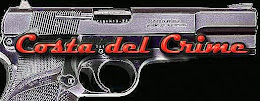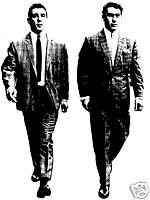Gérald Gallant was a contract killer at the centre of a shifting roster of gangsters accused of carrying out 28 homicides and 13 attempted murders
Gérald Gallant was a contract killer at the centre of a shifting roster of gangsters accused of carrying out 28 homicides and 13 attempted murders over three decades, peaking with Quebec's biker war from 1994 to 2002. Ten suspects were rounded up yesterday, based on evidence Mr. Gallant provided after turning informant. An 11th person facing a murder charge remained at large. In Donnacona, the news was met with stunned mutters that there was always something strange about the man. "I would see him regularly touring around the streets by bike," said Mayor André Marcoux, who lived three streets down from Mr. Gallant. "He really kept a low profile." From his unassuming redoubt near Quebec City, Mr. Gallant was in the middle of a gang war that eventually killed 160 people, police said. He and the 11 suspects targeted bikers, street gangsters and Italian mobsters with little regard for allegiance.
They also had little regard for the innocent. At least one of the dead and several of the wounded were described by police as bystanders or victims of mistaken identity. "I think this may allow me to close the circle," said Hélène Brunet, a former waitress who was shot in 2000 when a Hells Angels associate used her as a human shield. She became an outspoken critic of gangs. "It's a great relief and it restores some of your faith in justice."Hells loan shark Robert "Bob" Savard died in the attack on Ms. Brunet.
Mr. Gallant's stunning conversion from prolific hit man to police witness began in 2001, when he left his DNA at the scene of one of his final murders. But it wasn't until an RCMP tip, followed by a DNA match in 2006, that police started following him. He got wind police were onto him and fled to Europe in 2006. Months later, Swiss police snagged Mr. Gallant for credit card fraud and sent him back to Canada. In 2008, he suddenly and quietly pleaded guilty to the 2001 murder of Yvon Daigneault, a bar owner in the Laurentian town of Ste-Adèle. The plea was unusual for a man facing a tough automatic sentence of life in prison, with no chance at parole for 25 years. Police made it known Mr. Gallant claimed he had killed 26 people, but they added few details. The whiff of possible exaggeration dissipated rapidly yesterday, as police unveiled the list of 11 people charged with murder, including one-time leaders and members of competing Quebec gangs. Lieutenant François Doré, a senior provincial police spokesman, refused to say if a deal was struck with Mr. Gallant, who is not currently charged with any other crimes. Gang expert and author Julian Sher said some deal may be in the works, but hired killers occasionally seek to settle accounts. "I wouldn't call it conscience, but there is an element of wanting to clear the air, or wanting to get back at past masters," he said.Some arrested suspects, such as Frédéric Faucher, a former leader of the Rock Machine, and Raymond Desfossés, an alleged high-ranking member of the West End Gang, are alleged to have ordered hits. One of the more prominent dead was Paul Cotroni, the son of Montreal mob boss Frank Cotroni, who died in 1998.
They also had little regard for the innocent. At least one of the dead and several of the wounded were described by police as bystanders or victims of mistaken identity. "I think this may allow me to close the circle," said Hélène Brunet, a former waitress who was shot in 2000 when a Hells Angels associate used her as a human shield. She became an outspoken critic of gangs. "It's a great relief and it restores some of your faith in justice."Hells loan shark Robert "Bob" Savard died in the attack on Ms. Brunet.
Mr. Gallant's stunning conversion from prolific hit man to police witness began in 2001, when he left his DNA at the scene of one of his final murders. But it wasn't until an RCMP tip, followed by a DNA match in 2006, that police started following him. He got wind police were onto him and fled to Europe in 2006. Months later, Swiss police snagged Mr. Gallant for credit card fraud and sent him back to Canada. In 2008, he suddenly and quietly pleaded guilty to the 2001 murder of Yvon Daigneault, a bar owner in the Laurentian town of Ste-Adèle. The plea was unusual for a man facing a tough automatic sentence of life in prison, with no chance at parole for 25 years. Police made it known Mr. Gallant claimed he had killed 26 people, but they added few details. The whiff of possible exaggeration dissipated rapidly yesterday, as police unveiled the list of 11 people charged with murder, including one-time leaders and members of competing Quebec gangs. Lieutenant François Doré, a senior provincial police spokesman, refused to say if a deal was struck with Mr. Gallant, who is not currently charged with any other crimes. Gang expert and author Julian Sher said some deal may be in the works, but hired killers occasionally seek to settle accounts. "I wouldn't call it conscience, but there is an element of wanting to clear the air, or wanting to get back at past masters," he said.Some arrested suspects, such as Frédéric Faucher, a former leader of the Rock Machine, and Raymond Desfossés, an alleged high-ranking member of the West End Gang, are alleged to have ordered hits. One of the more prominent dead was Paul Cotroni, the son of Montreal mob boss Frank Cotroni, who died in 1998.















